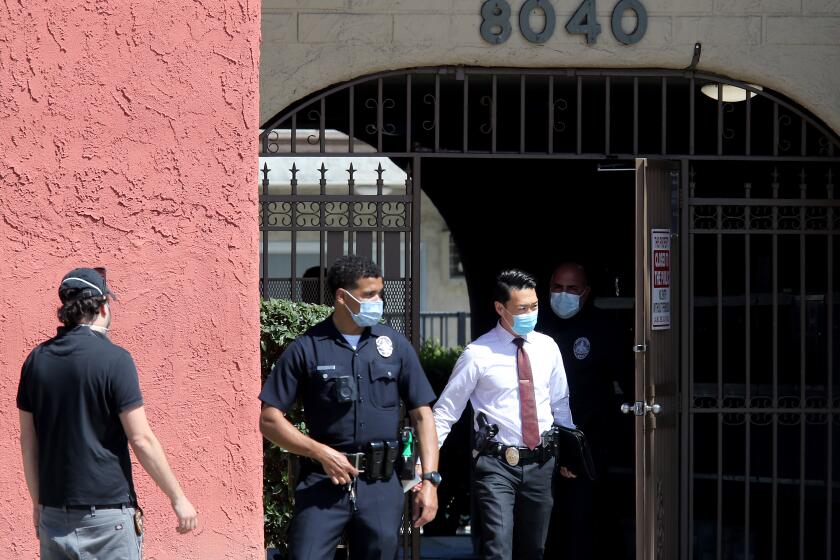Shadow of COVID-19 and economic downturn hovers over elections in Ecuador and Peru
- Share via
QUITO, Ecuador — Voters go to the polls Sunday to elect new presidents in two neighboring South American nations — Ecuador and Peru — that have been battered by the pandemic, economic contractions and political turmoil.
In both Andean countries, polls have shown widespread dissatisfaction with leadership failures to stem rising unemployment and poverty, much of it fallout from the COVID-19 crisis — which has hit Latin America especially hard, causing social and economic devastation across the region.
Ecuador and Peru have also both seen recent surges in coronavirus cases, slow vaccine rollouts and scandals involving politically connected individuals receiving inoculations before their turn.
Ecuadoreans will cast ballots in a contentious runoff vote featuring two ideological divergent candidates — Andrés Arauz, 36, a left-wing economist, and Guillermo Lasso, 65, a conservative businessman. They were the top two finishers in hotly disputed initial balloting in February.
Incumbent Ecuadorean President Lenin Moreno is not seeking reelection.
The mother of the children, 30-year-old Liliana Carrillo, was taken into custody in Tulare County after fleeing the scene.
Peruvians will select from a fragmented field of more than a dozen presidential aspirants who span the ideological spectrum, from far left to hard right. No candidate in Peru is expected to win a majority, probably forcing a June runoff between the two highest vote-getters.
Peru’s current president, Francisco Sagasti, is not on the ballot. He took office in November as a caretaker leader after a political crisis saw the country go through three presidents in a week.
In Ecuador, recent polls have shown a narrowing lead for Arauz, a protege of former President Rafael Correa, a leftist sentenced to prison for corruption who fled to Belgium. Correa, who remains a divisive figure here, has denied the allegations and called them politically motivated.
The race in Ecuador has become a kind of referendum on whether free-market principles or leftist-style social spending is the best remedy for the country’s economic woes. Arauz’s side has portrayed Lasso as a tool of big business, while Lasso backers call Arauz the embodiment of a failed socialist vision.
Arauz finished first in the initial round of voting with promises to bolster payouts and other support for the hard-hit poor and working classes. In recent weeks, Lasso has sought to temper his conservative banker image with vows to help the poor and increase environmental protections, while stressing the need for foreign investment and pro-market reforms.
More than a quarter of Ecuadorean voters remained undecided or plan to submit blank or spoiled ballots (damaged or marking multiple candidates), polls show. That indicates a broad discontent about the direction of the nation of 17 million.
Slumping prices for oil, Ecuador’s chief export, have contributed to the country’s economic woes. Many voters are edgy about the future.
“I don’t feel that either of the candidates represents me — both make me nervous,” said Alexandra Muñoz, 43, an economist in Quito, the capital. “The middle class has been ravaged.”
Allegations of fraud marred February’s initial round of balloting. Such charges are also expected to follow Sunday’s election, whatever the result, observers say.
“It has been a campaign with attacks from both sides,” said Santiago Basabe, a political analyst in Quito. “Most of them unjustified.”
Yaku Pérez, an Indigenous activist who narrowly missed a spot in the presidential runoff and alleged widespread fraud, has called on his supporters to file spoiled ballots.
Arauz’s backers have accused Lasso’s camp of smearing him as a radical socialist who would turn Ecuador into a Venezuelan-style economic basket case and abandon the U.S. dollar as the nation’s currency. Arauz has denied the charges and portrayed himself as a moderate, but some voters are skeptical.
“My fear is that we will become another Venezuela” if Arauz is elected, said Francisco Vázquez, 41, a publicist in Quito who plans to vote for Lasso. “We need a secure situation to advance, to work.”
Many supporters of Arauz call Lasso a surrogate for banks and international capital who has little feel for the difficult lives facing most Ecuadoreans. His election, they say, would only exacerbate the country’s deep inequalities.
“Arauz will fight against monopolies and work for productivity, not only for big business, but also for small and medium sectors” of the economy, said Mauricio Galindo, 45, a historian and Arauz supporter. “That is the productive base of our country.”
Ecuador’s new president is to take office in May for a four-year term.
Times staff writer McDonnell reported from Mexico City and special correspondent Jaramillo Viteri from Quito. Special correspondent Adriana León in Lima contributed to this report.
More to Read
Sign up for Essential California
The most important California stories and recommendations in your inbox every morning.
You may occasionally receive promotional content from the Los Angeles Times.











